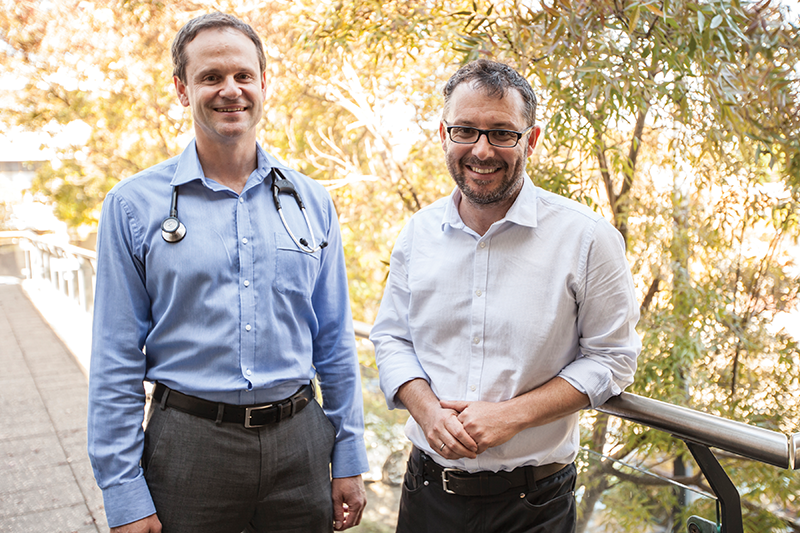
Dr André Schultz and Dr Tom Snelling
The Kids researchers are pioneering an exciting new approach to clinical trials, which aims to fast-track the best treatments for people with rare and complex diseases.
In traditional clinical trials, two treatment strategies are assessed at a time – which can needlessly delay improved treatment and quality of life for participants.
Instead, The Kids researchers will try an ‘adaptive platform trial’ – a type of ‘learning health care’ model which will allow researchers to learn as quickly as possible which treatments are best, which treatments aren’t, and in whom.
Patients with cystic fibrosis will be the first to take part in the Australia-wide platform trial to find improved ways to manage the condition.
Dr Tom Snelling, from the Institute’s Wesfarmers Centre of Vaccines and Infectious Diseases, said the BEAT-CF trial would analyse multiple treatments at once in different areas of management to optimise treatment of lung infections, or exacerbations.
“Trials to date have only assessed two treatment strategies at a time, which can delay translating the results into improvements for participants,” Dr Snelling said. “This new approach provides a faster, more effective way to assess which treatments are best for particular patients.”
A web-based tool, currently in development with Murdoch University, will enable clinicians to readily access patient information, including known allergies and medication lists, and receive recommended treatments for each patient based on computer algorithms that analyse the clinical trial data.
Dr Snelling said patients would also report their symptoms, such as coughing and fatigue, their ability to attend school and participate in sport, the effect on appetite, and the overall burden of treatment.
“We are very keen to capture some of this other information about symptoms so we can make sure that whatever treatments are being promoted through this adaptive process not only improve the function of the lungs but also improves quality of life as well,” he said.
Dr André Schultz, honorary research fellow at The Kids Research Institute Australia and director of the Cystic Fibrosis Centre at the Perth Children’s Hospital, where the first patients will be enrolled, is confident that BEAT-CF will revolutionise the treatment of cystic fibrosis.
“We have so many questions around exacerbations that have not been answered with conventional clinical trials,” Dr Schultz said.
“If we used conventional randomised-controlled clinical trials to answer these questions, it would take us many decades. So what we’re trying to do at BEAT-CF is use a different approach and compare multiple treatments against each other at the same time.
“The web-based platform will allow data entry by clinicians at the bedside, but also by patients. We hope to get patient outcomes collected in real time – telling us how the patient feels as opposed to just what the doctor measures.”
Dr Snelling hopes the trial will eventually become accessible to the more than 3,000 children and adults with cystic fibrosis across Australia. He believes a major bonus is that these participants will benefit from better treatments during the course of the trial.
“Because we are always looking at the new data as it is accumulating, we can progressively assign more patients to whatever treatment or combination of treatments are looking most promising,” he said. “It means that patients within the trial are more likely to receive the best treatment for them, rather than waiting until the trial is over.”
It is hoped that BEAT-CF will be used as a leading example of how platform clinical trials can be implemented, so other researchers will be more likely to use novel clinical trial designs for other complex and serious diseases.
As the first WA research project to benefit from the Federal Government’s Medical Research Future Fund, the BEAT-CF trial was awarded a $3.4 million, five-year grant this year. Together with funding from the BHP Blue Sky Awards scheme, this has enabled the preparatory work to begin, such as consulting key stakeholders, fine-tuning the study protocol, refining the algorithms, and finalising the patient subgroups. A philanthropist has sponsored development of the data capture tool for patients.
“We’ve had all these ideas but you can’t take it further without some funding,” Dr Schultz said. “It’s very valuable for us to get going with this massive project.”
What's next
- The first patients are expected to be recruited in 2019 at Perth Children’s Hospital and Sir Charles Gairdner Hospital, after which the trial will expand to other Australian sites. “The idea is that this trial doesn’t stop, it keeps rolling on and answers more and more questions we have as clinicians so we can improve treatments for patients continuously,” Dr Schultz said.
- The platform could also be used to evaluate the new disease- modifying drugs over a longer period of time and look into other aspects of cystic fibrosis management, such as nutrition and psychological needs.
